Complete Magento 2 Feature List for Business Success
Vinh Jacker | 03-17-2025
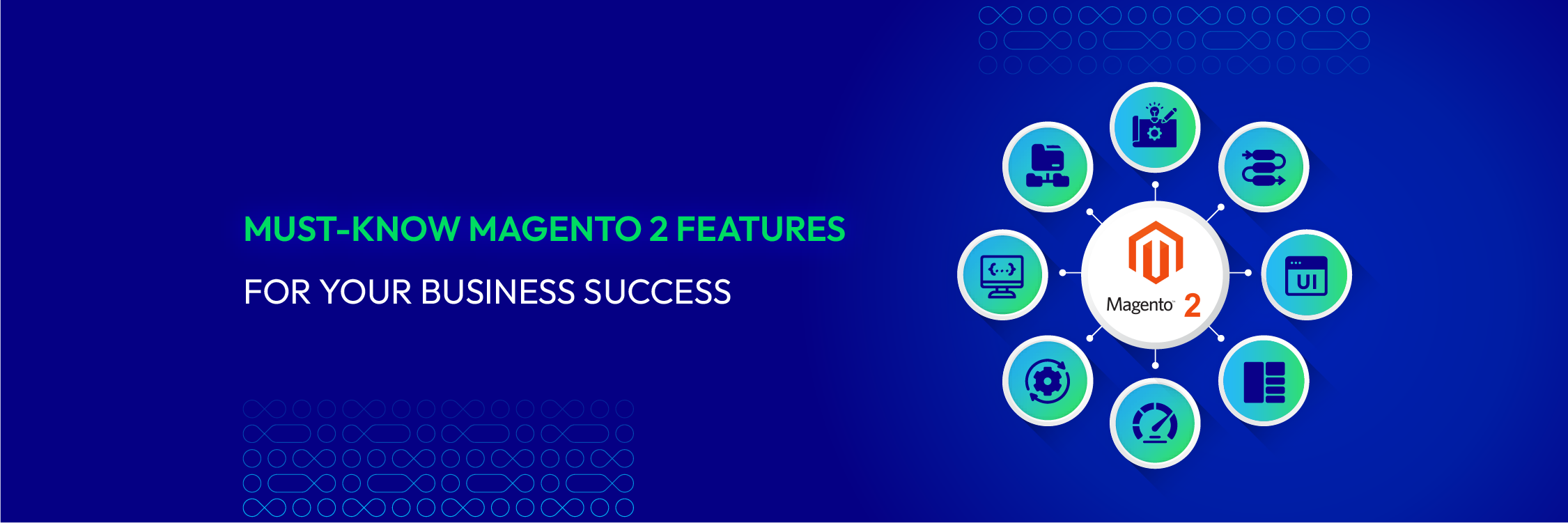
Magento have been one of the most famous and well-used platforms for building online stores because of its user-friendly interface. While it provides a lot of useful features, new beginners who don’t know much about these functions might fail to take advantage of them. This blog will cover all must-know features of Magento 2 and share secret tips to bring your store to a new height.
Key Magento 2 Features for Open Source and Commerce
Let’s explore the core functions you need for Magento Open Source and Commerce!
1. Catalog Management
When a merchant uses Magento 2, they can easily handle categories and products, inventories as well as pricing, images, and videos thanks to its robust catalog features.
Product Management
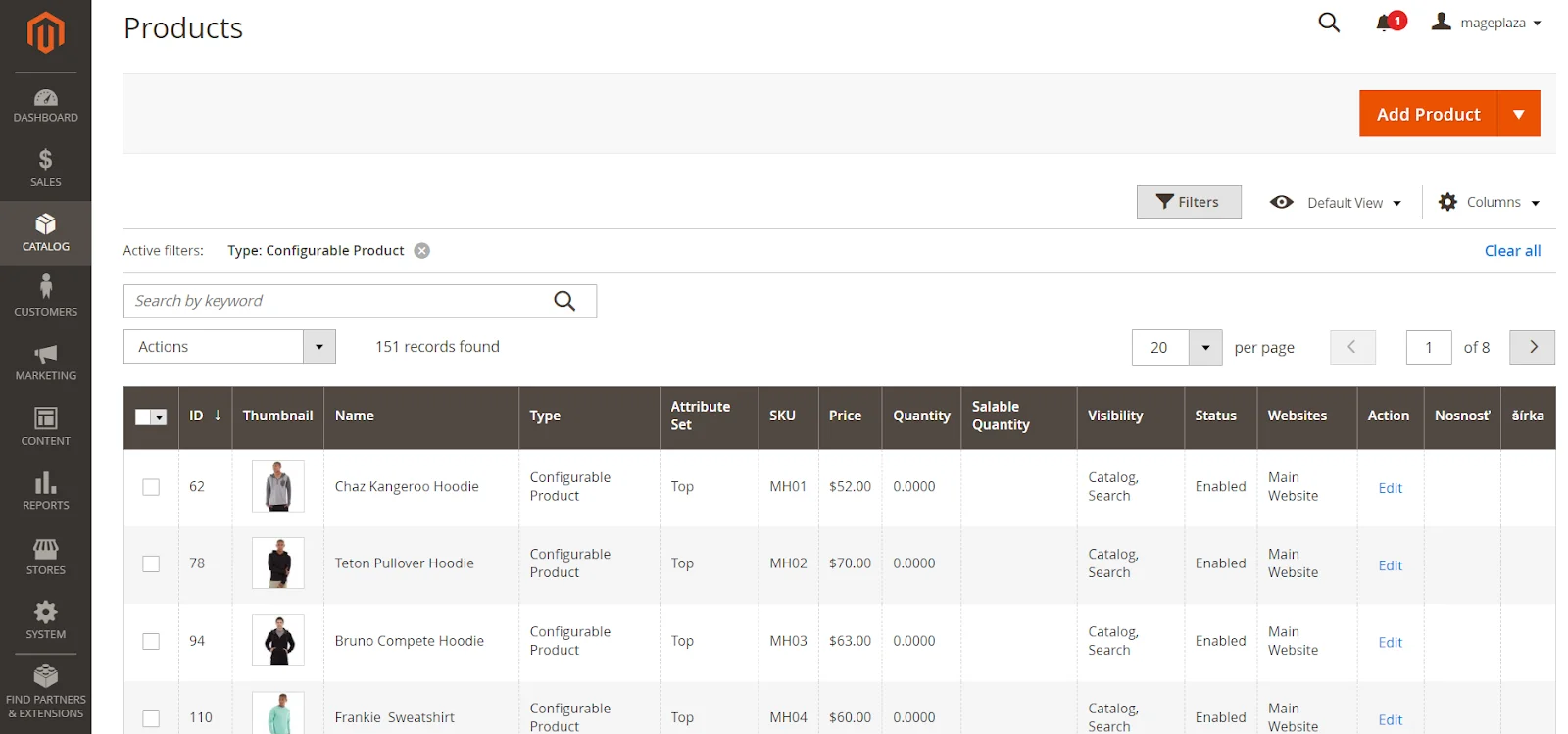
There are different 6 types of products supported by Magento 2 in a flexible workspace. Each type is designed for specific products, using dynamic attributes that drive other functionalities in Magento.
Though it may look complicated to begin with, customization options empower you to create any type of product, which is often limited on simpler platforms. Even for thousands of products, smooth management is possible through the use of a smart filter tool.
Category Management
The categorization of products will allow customers to easily navigate the website and make purchase decisions.
Catalog Browsing
Magento 2 offers a faster, smoother shopping experience with features like smart search, layered navigation, breadcrumbs, and advanced search. Merchants can also restrict certain categories and products for targeted marketing.
Product Browsing
Detailed product information is provided including images, stock status, pricing options (regular, special/…) and compare and add to wishlist functionality. Additionally visible are product ratings and reviews so as to improve the shopping experience.
2. Content Management
Content holds a very important role in eCommerce. The piece of information it gives to the customer is crucial in making your online store unique from other competitors.
Magento 2 is one of the most sophisticated CMS systems; therefore, this platform has a strong content management system in which you can create multiple rich materials like CMS pages, widgets, and blocks.
Magento 2 CMS Pages
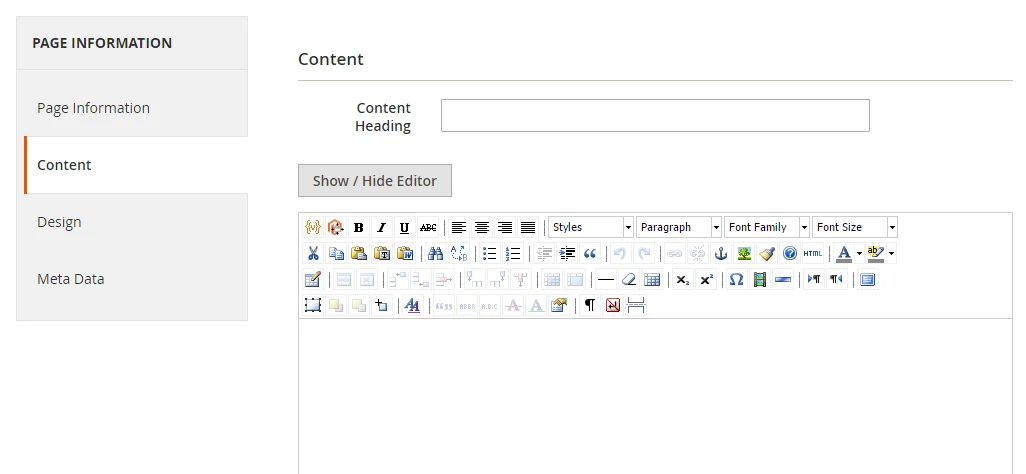
Selling online requires more than just product pages and catalog pages by default. You have to create additional content‐rich web pages for example “About Us” or “Privacy Policy”. With its WYSIWYG editor, Magento 2 offers an easy way to insert text, images, and videos without necessarily writing complicated codes enabling building user-friendly pages that can be optimized for search engines.
Magento 2 Widgets
By improving user experience at the front end and enhancing sales, widgets allow inclusion of catalog links, product lists, or content within the whole store environment. There are 9 widget types as follows:
- CMS Page Link
- CMS Static Block
- Catalog Category Link
- Catalog New Product List
- Catalog Product Link
- Catalog Products List
- Order, and Returns
- Recently Compared Products
- Recently Viewed Products
Magento 2 CMS Blocks
Similar to CMS pages type of creation through the WYSIWYG editor lets us generate various content blocks; however, whereas CMS Pages stand alone, the blocks interactively attach through different site areas using widgets.
Magento 2 Design and Themes
Magento 2 presents a fully customizable design and themes, unlike any other CMS alternatives. Apart from the standard themes, you can also customize your CMS pages, widgets, blocks, or even product/category pages following your store’s style.
3. Marketing Support
Now that you have products and content set up, it is time to use marketing strategies in order to drive sales. Magento 2 offers built-in marketing tools for this purpose.
Promotions
Shoppers love discounts, thus promotions must be part of increasing engagement and sales among customers. They include:
- Discounts during special occasions such as Saint Valentine’s Day, Black Friday, or Christmas.
- Sending coupon codes to loyal customers also encourages them to purchase again.
- Providing free shipping for orders above certain amounts.
«««< HEAD
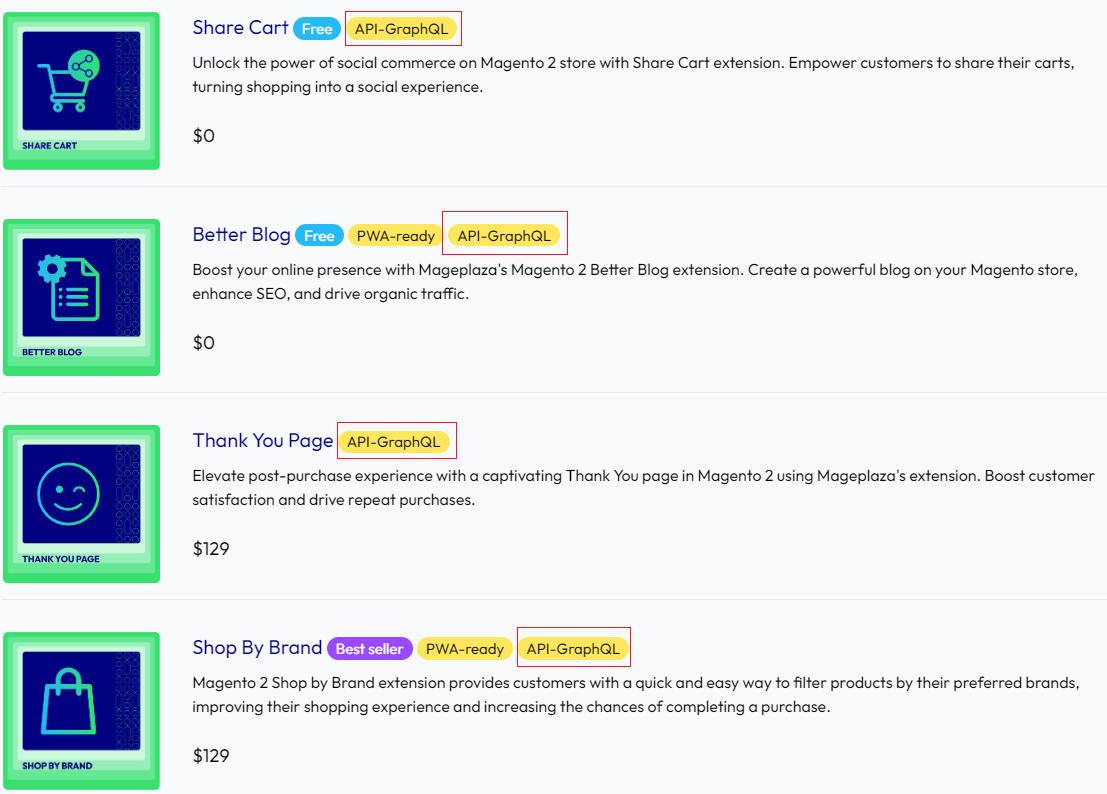
6. Progressive Web Applications
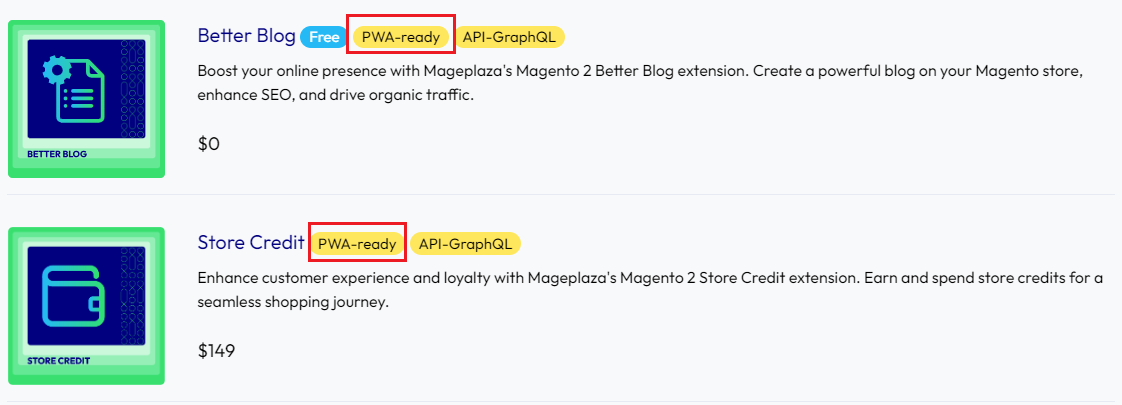
Progressive Web Application (PWA) is an advanced web technology that enables app-like shopping experiences, offering optimized content on both mobile and desktop devices.
As more customers turn to mobile shopping, Magento’s PWA Studio becomes a great solution, helping maximize mobile commerce by allowing you to create tailored content and visuals for smaller screens.
Progressive Web Application benefits:
- PWA storefront customization
- Performance optimization
- Responsive website design
- User-friendly mobile interfaces
- Offline content delivery
- Easy social media sharing
7. Payments and Financing
Magento provides a wide range of global payment options for store owners, including well-known methods like PayPal Express Checkout and Braintree.

Easily integrate multiple payment gateways into your store and benefit from built-in offline payment options such as COD (Cash on Delivery).
Moreover, with Magento’s support for PCI Compliance guidelines, you can safely send credit card data directly to the payment gateway, bypassing the Magento system and keeping sensitive information secure. Outstanding features include:
- Multiple payment methods
- Famous payment options like PayPal Credit
- Money orders acceptance
- Bank transfer payments acceptance
- Conversion boost with PayPal Smart Payment
- Access to PCI compliance guidelines
- Ability to add secure payment gateways
- Change currency formats and currency symbols easily by Magento 2 Currency Formatter
8. Reporting Data and Business Intelligence

Magento Open Source simplifies the conversion of tracking data into visual reports. The reporting feature provides store owner metrics like sales reports, customer behavior, etc. The admin dashboard offers a comprehensive overview of reports for quick analysis. Furthermore, Business Intelligence provides real-time insights, allowing you to track retention rates and sales performance. It enables you to leverage data to enhance the customer experience and centralize data analysis while eliminating data-related obstacles.
Reporting features:
- Google Analytics
- Sales report
- Tax report
- Highest-viewed products
- Low stock and searched product report
- Sales invoice total
- Abandoned cart report
- Report overview
Business Intelligence features:
- Business metrics customization
- Insights collecting
- Pre-built reports for data visualization
- Scheduled and emailed analysis
Key Magento 2 Features in Open Source And Commerce Versions
For each version, the Magento team releases two distinct editions: Magento 2 Open Source (formerly known as Magento 2 Community Edition) and Magento 2 Commerce (previously Magento 2 Enterprise Edition).
Magento 2 Commerce is an enhanced version of the Open Source edition. Regardless of your choice, both editions offer outstanding features that help maximize efficiency and performance.
Now, dive into the specific features of Magento 2 for Both Open Source and Commerce. Catalog Management.
Manage Catalog
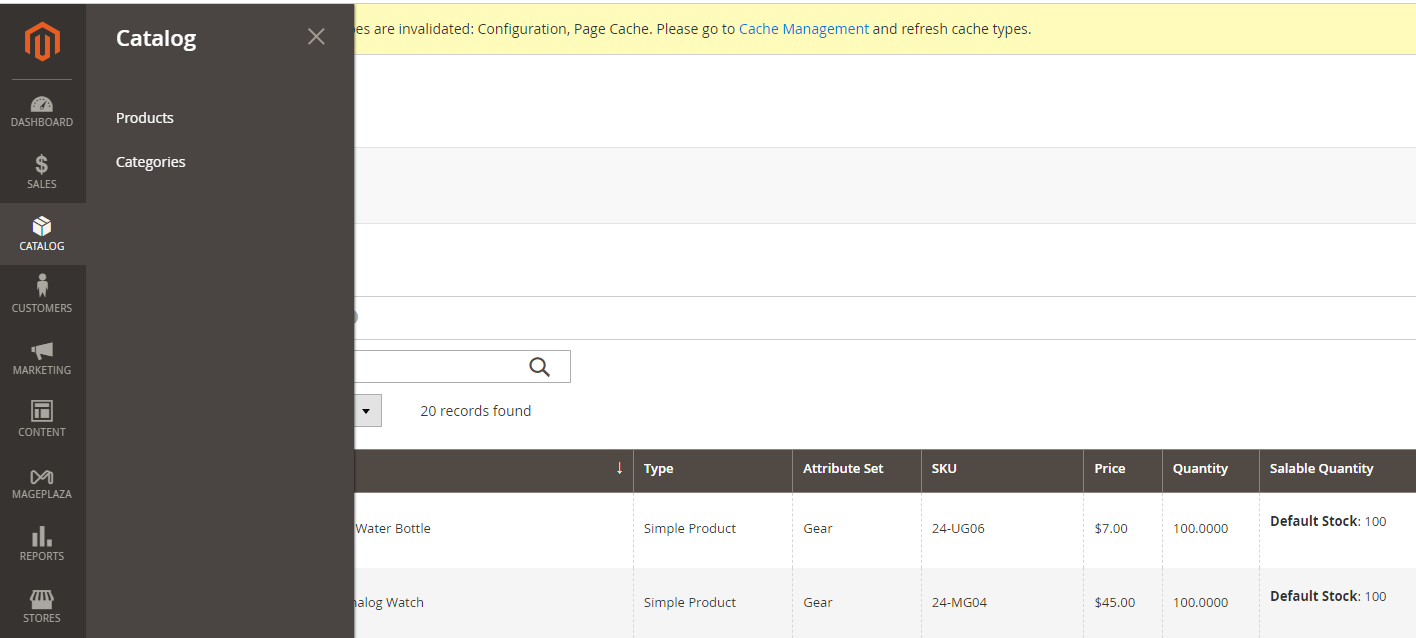
Product
Regarding product catalog management, it allows the store owners to add products. Besides, this feature ensures optimal viewing across all devices by adapting product visuals and videos to different screen sizes.
The system also supports the addition of various product types and the definition of product specifics via attributes.
Another key advantage of Magento is its pricing schedule flexibility. With the help of advanced pricing tools, online businesses can provide the most competitive rates for their products.
The catalog management functions include:
-
Product grouping by size, color, and other attributes: Magento allows you to organize products into categories and subcategories based on various attributes such as size, color, material, etc. This helps in creating a structured and easily navigable product catalog.
-
Price points: You can set different price points for products based on factors like customer groups, quantity discounts, or promotional offers. This flexibility in pricing allows businesses to cater to different customer segments and marketing strategies.
-
Virtual product downloads: Magento supports the sale of virtual products such as software, e-books, or digital subscriptions. Customers can purchase these products and download them directly from the website.
-
Product attributes: You can define custom attributes for products to provide detailed information and improve searchability. Attributes can include things like brand, manufacturer, specifications, etc.
-
Automatic image resizing: Magento automatically resizes product images to fit different device sizes, ensuring a consistent and optimized viewing experience across various devices including desktops, tablets, and smartphones.
-
Advanced pricing options: In addition to setting basic prices, Magento offers advanced pricing options such as tiered pricing, special pricing for specific time periods, or bundled product pricing. This helps businesses implement sophisticated pricing strategies to attract customers and boost sales.
-
Product tags and reviews: Magento allows customers to add tags to products, making it easier to find related items through search or filtering. Additionally, customers can leave reviews and ratings for products, which helps build trust and credibility among potential buyers.

Category
The category in Magento refers to the organizational structure used to manage and display products. Categories are essential for assisting customers to navigate the store and find products. Here’s a summary of key points about Magento categories:
-
Category Structure: The catalog’s category structure is like an upside-down tree, with the root category at the top. Each section can be expanded or collapsed, and the first level of categories typically appears in the main menu.
-
Creating Categories: Before adding products, you should build the basic category structure. Products must be assigned to at least one category. Categories can be created in advance or quickly created while creating a product.
-
Category Tree: The category tree in the admin panel reflects the catalog structure and is used to manage categories and subcategories.

Manage content
CMS Pages
Magento 2 provides a powerful WYSIWYG editor for creating and managing content, which stands for “What You See Is What You Get.” This editor allows users to design and update pages easily without the need for coding skills.
The process includes setting up the page title, content, and SEO options, and you can preview your page before it goes live.
Additionally, CMS pages can be made more attractive by adding images, videos, and CMS blocks to improve customer engagement.
Widgets
This feature enables the integration of any catalog link or product list and facilitates content creation across Magento 2 stores. Its purpose not only extends to improve the frontend presentation but is also designed to boost sales.
The utility offers nine distinct widget types available, including:
-
CMS Page Link
-
CMS Static Block
-
Catalog Category Link
-
Catalog New Product List
-
Catalog Product Link
-
Catalog Products List
-
Orders and Returns
-
Recently Compared Products
-
Recently Viewed Products
The selection will determine the content types and their placement for display.
CMS Blocks

CMS Blocks are reusable content elements that help maintain consistent messaging and design throughout your store. They can be easily managed through the backend by navigating to Content> Elements > Blocks.
Here, you can add new blocks, enable them, set titles and identifiers, modify, and assign them to specific store views. CMS blocks are particularly useful for content that appears on multiple pages, such as promotional messages or contact information.
Design and Themes
Another feature that sets Magento 2 apart from other content management systems is its fully customizable design and themes, which make Magento 2 surpass other content management system platforms.
The design and themes of Magento 2 are crucial for creating a visually appealing and responsive online store. Themes are pre-designed templates that provide a range of design options, including color schemes, font styles, and layout configurations. These themes can be adjusted to match the branding and style of your eCommerce business.
When selecting a theme, it’s important to consider factors like mobile responsiveness, customization options, page loading speed, SEO optimization, and browser compatibility. Magento 2 offers a wide selection of themes, both free and premium, that can be easily installed and customized to meet your business needs.
These content management features are integral to creating a rich and user-friendly shopping experience on your Magento 2 store. They offer flexibility and control over how content is presented and managed, contributing to the overall effectiveness of your eCommerce strategy.
Support Marketing
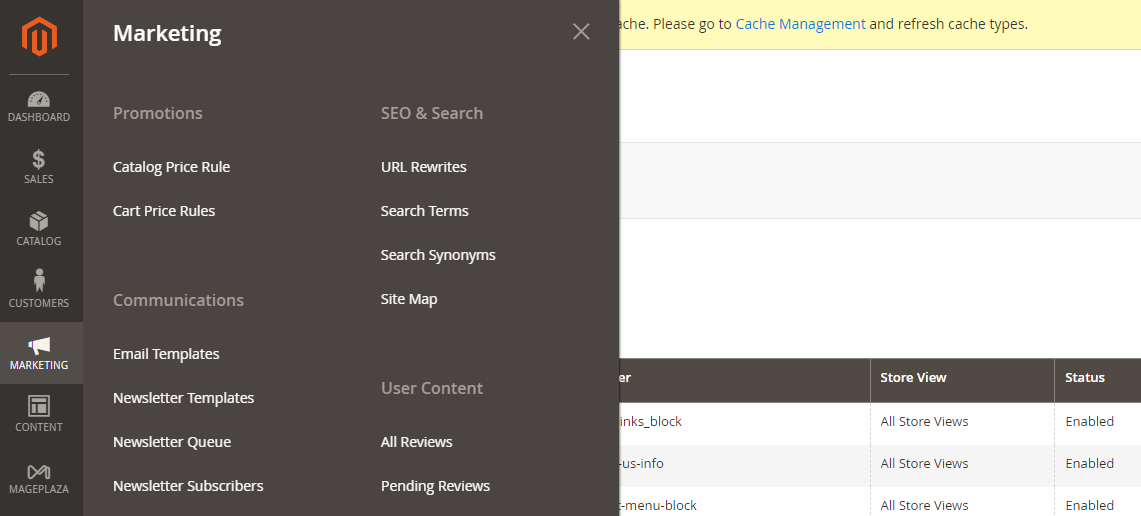
Promotions
Customers always love sales and discounts. Thus, to promote customer engagement and enhance revenue, incorporating promotions is essential. Consider the following strategies to captivate your audience:
-
Seasonal Offers: Entice customers with compelling discounts on select items during festive seasons such as Valentine’s Day, Black Friday, Christmas, and Summer Sales.
-
Exclusive Coupons: Reward loyalty by distributing coupon codes to frequent shoppers, incentivizing their return.
-
Shipping Incentives: Encourage larger purchases by offering free shipping once a specific order value is reached.

These promotional activities can be easily implemented when you use these Magento features. By defining flexible conditions for Catalog Price Rules and Cart Price Rules, promotions are automatically triggered in accordance with the specified regulations.
Communicate Via Email Marketing
When you always stay in touch with customers and stay updated with online store trends, the chances of your business’s success significantly increase.
By using Email Templates, you can create customized email campaigns that align with your brand’s identity and convey your message effectively. Additionally, Magento 2 supports Newsletter Templates and Newsletter Queue functionalities, enabling you to efficiently manage and distribute newsletters to your subscriber base.
Furthermore, with the help of suitable extensions, you can automate various aspects of your email marketing efforts. These extensions can assist in managing email lists, setting up automated campaigns such as abandoned cart emails, and sending follow-up messages to customers after their purchases, all of which can contribute to fostering customer loyalty and encouraging repeat business.
Provide SEO & Search
Magento 2’s SEO and search tools offer a comprehensive set of tools and features designed to optimize your online store for search engines, ultimately enhancing product visibility and discoverability. Some of these SEO optimization features include:

-
URL Rewrites: Magento 2 allows you to create SEO-friendly URLs, which are easier for search engines to understand and index.
-
Metadata Management: You can set meta titles, descriptions, and keywords for products and categories, helping search engines better understand the content of your pages.
-
Site Mapping: Magento 2 facilitates the creation and management of sitemaps, which provide search engines with a structured map of your website’s content, making it easier for them to crawl and index your site.
-
Catalog Navigation: The platform offers tools for optimizing catalog navigation, ensuring that products are organized in a user-friendly manner and enhancing the overall browsing experience for customers and search engines alike.
-
Rich Snippets: Magento 2 supports the use of rich snippets, which are additional pieces of structured data that can be added to your website’s HTML to provide search engines with more information about your products, resulting in enhanced search results listings.
Therefore these activities can easily be done with flexible Catalog Price Rules and Cart Price Rules in Magento 2. Promotions are activated automatically when conditions are fulfilled.
Communications (Email Marketing)
It is very important for success that you maintain communication with clients through emails sent out regularly. Magento 2 gives an outlet for customizing all emails meant for customers via the use of templates incorporating brand logos and other content rich in nature.

Additionally, you can manage subscribers and send newsletters regularly so as to keep your product alive in their minds thus increasing traffic to your store.
SEO & Search
Search engine optimization is what Magento is known for. URL rewrites, metadata, sitemaps, and catalog navigation features are among those provided by Magento 2 for best SEO practices.
Additionally, it provides customers with advanced search functions, for instance:
- Catalog Navigation: top navigation, layered navigation, breadcrumb trails, and pagination.
- Catalog Search: quick & advanced search; search results with weighted terms.
- Search Terms: popular search term management and viewing search term reports.
Other Marketing Features
Take advantage of lean user reviews, dot mailers as marketing automation tools, and social media connectors such as Facebook to utilize the most out of the marketing features in Magento 2.
4. Cart & Checkout
When buyers put items in their cart, they are close to making a purchase, so it’s important to offer a smooth, user-friendly experience to reduce cart abandonment.
Informative Shopping Cart Page
Magento 2 provides a mini cart and a complete shopping cart page thus enabling customers to examine their selected products before making payment. It also serves as an ideal place to exhibit cross-sell items to encourage last-minute additions.
Integrated Checkout Process
In e-commerce, checkout is very important. Consequently, compared to Magento 1, Magento 2 has made this process simpler as it is reduced to only two steps: Shipping Review & Payments which makes it tidier and more convenient for clients.
Payment Options

Magento 2 Open Source and Enterprise versions provide several payment options such as COD, Check/Money Order, Bank Transfer, Purchase Order, PayPal, and Braintree among others. This ensures easy and safe payments for customers as well as sellers.
In addition; it enables the inclusion of other gateways through Magento Marketplace in addition to those already available on Magento 2.
Shipping Methods
Having more than one shipping option can increase conversion rates. To begin with, Magento 2 enables merchants to use basic shipping choices such as free shipping, table rates, flat rates or dimensional weight alone.
On the other hand if one integrates carriers like UPS, FedEx or DHL then the shipping charges will be updated automatically based on the merchant’s settings along with customer preferences.
5. Order Management
For the effective fulfillment of customer orders, order management involves coordinating people, processes, and collaborations among various parties. Therefore, both the store owners and the customers must have a say during this process.
Admin Order Management
Magento 2 provides a dedicated workspace for administrators to control orders where canceling, holding as well as creating shipments, invoices, or credit memos are among the possible activities to be undertaken. Typically, however, the order workflow is organized and easy to follow.
Customer Order Tracking
-
Logged-in Customers: Customers have access to their previous orders through “My Orders” tab under Account Dashboard where they can also reorder products.
-
Guest Customers: In case the admin enables “Order and Returns” feature; guest shoppers may track their orders by entering required information.
6. Customer Management
Besides the customer grid, merchants can view, update, and trace customer profiles. They also have the freedom to delete or establish accounts whenever necessary.
Apart from default customer groups (General, Not Logged In, Wholesale), the admin is able to create custom groups for easier management purposes. These groups are fundamental in using other Magento 2 functionalities too.
7. Store Management
One reason why more store owners are choosing Magento is that it supports a hierarchy structure. By so doing, they can have numerous websites, with each of them having many stores, and each store can have various views; all these can be handled via one Admin panel.
Global businesses prefer it since they can change tax rates, currencies, and attributes according to their needs.
8. System Management
Merchants can import or export data such as product pricing, customers, and tax rates in this section through CSV files.
Moreover, system management includes admin roles and permissions setup, scanning for security issues, and compliance with security best practices. Additionally, to enhance the system’s performance, you can install extensions and integrate other tools.
With indexed and cache management management tools frequently for your website safety, scheduled operations and system backup for Magento 2 are some of its features.
9. Analytics and Reporting

To better monitor Magento 2 website performance, reporting is a crucial tool for all store owners. The Reports Menu allows merchants to review data about their marketing efforts, sales performance, product statistics, and customer activities that are up-to-date.
Magento 2 incorporates Google Universal Analytics which links with Google analytics for you to acquire insights into your businesses and formulate well-informed decisions for success.
For more advanced features, check out Mageplaza’s Magento 2 Google Tag Manager extension. It provides online stores with comprehensive reports about tracking events. Particularly, these insights about consumer behavior, shop performance, and promotional activities help enhance business expansion strategies.
Tips for Magento 2 beginners
For those entering the world of Magento 2 e-commerce or small business owners taking their first steps, it’s crucial to proceed cautiously. There are two points that you need to pay attention to.
- Apply essential features to your store:
Ensure your store has enough essential functions that help improve customer satisfaction, as relying solely on the default Magento features may lead to disappointment.
- Select suitable features only:
Avoid buying too many extensions to build your store in this early stage. You may not be able to afford such a fee yet. Instead, choose wisely and select the most essential modules that meet basic needs first. As your revenue grows, you can invest in further development to enhance your store later.
In order to address these needs, we recommend exploring the Starter Pack for Magento 2.
What’s in the Starter Pack?
-
One Step Checkout Ultimate: Improve customer satisfaction and reduce cart abandonment with a user-friendly and efficient one-step checkout page.
-
Special Promotion: Flexibly create and manage special promotions, discounts, and offers to attract and engage customers.
-
Ajax cart: Enhance the shopping experience with a dynamically updating cart that allows customers to add and remove items without page refresh.
-
Layered Navigation Ultimate: Improve navigation and search functionality by enabling customers to filter products based on various attributes and specifications.
-
SEO Ultimate: Optimize your online store for search engines to improve visibility and drive organic traffic to your website.
Significant benefits of the Mageplaza Starter Pack:
-
Comprehensive Solution: The Starter Pack offers a comprehensive set of extensions that cover various aspects of your online store, including checkout, promotions, navigation, and SEO. This means you have all the essential tools in one package, simplifying the process of setting up and managing your store.
-
Cost Savings: By purchasing the Starter Pack, you enjoy significant cost savings compared to buying each extension individually. The discounted package price allows you to access multiple advanced features while staying within your budget. Currently, the pack is off 25% at only $1,121.
-
Time Efficiency: With the Starter Pack, you don’t need to search for and evaluate multiple extensions. The pack includes carefully selected and highly functional extensions that have been designed to work seamlessly together. This saves you time and effort in finding and integrating separate extensions.
-
Seamless Integration: The extensions in the Starter Pack are developed by Mageplaza and are designed to work seamlessly with Magento 2. This ensures compatibility and reduces the risk of conflicts or compatibility issues when adding new features to your store.
-
Dedicated Support: As a Starter Pack user, you receive enthusiastic support from Mageplaza’s technical team. This means you can reach out for assistance, guidance, and troubleshooting whenever you encounter any issues or have questions about the extensions included in the pack.
-
Continuous Updates: Mageplaza is committed to providing regular updates and improvements to its extensions. With the Starter Pack, you can benefit from these updates, ensuring that your store remains up to date with the latest features, security enhancements, and performance optimizations.
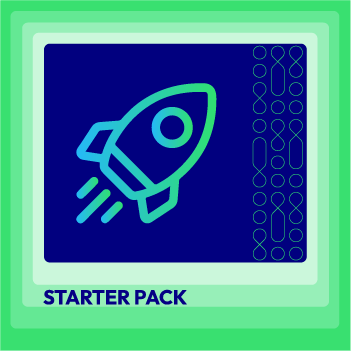
Get all the essentials you need to launch your business with our ready-made pack
Check it out!Conclusion
As an e-commerce platform of high quality with many resources aimed at managing orders, and product marketing… effectively, Magento 2 offers plenty of opportunities for success.
To make the most of Magento 2, check out the top Magento 2 Extensions by Mageplaza as additional tools that will enhance the strength of your store. We hope this article has helped you understand these key features.









